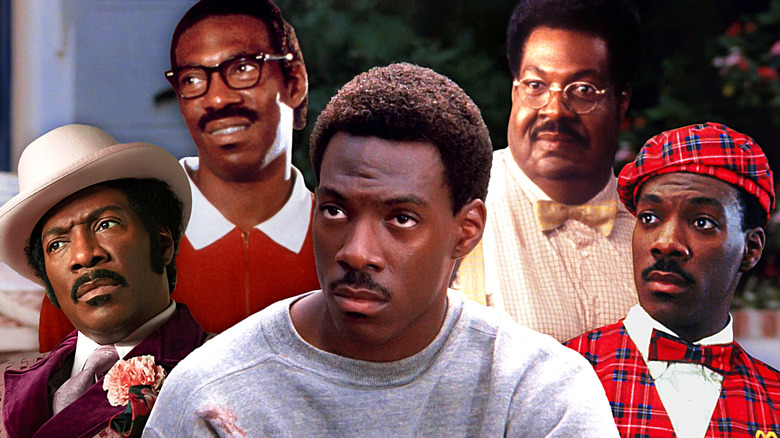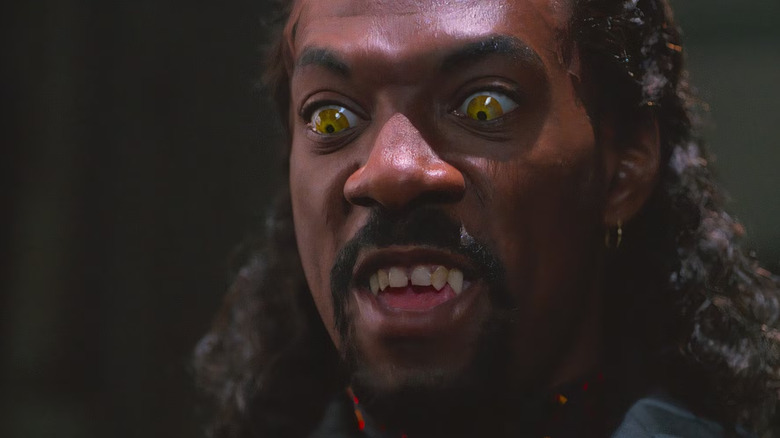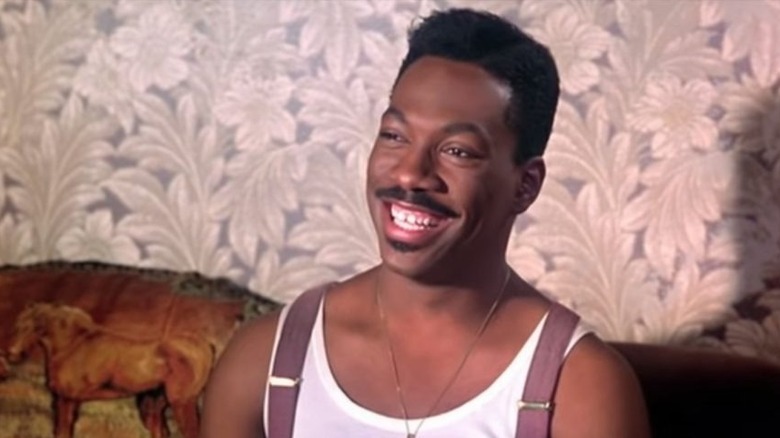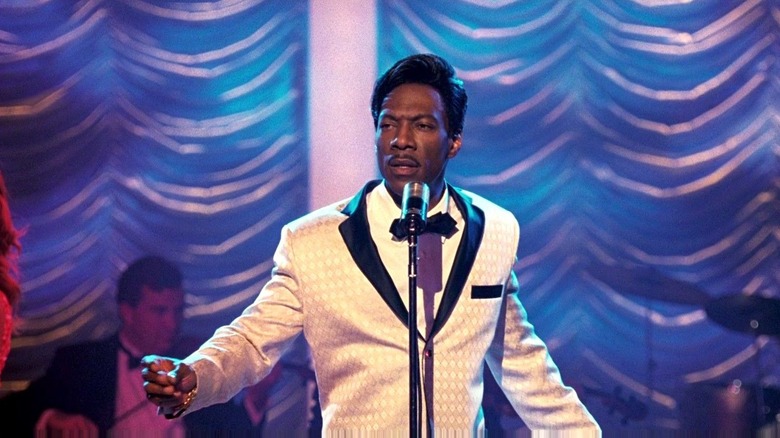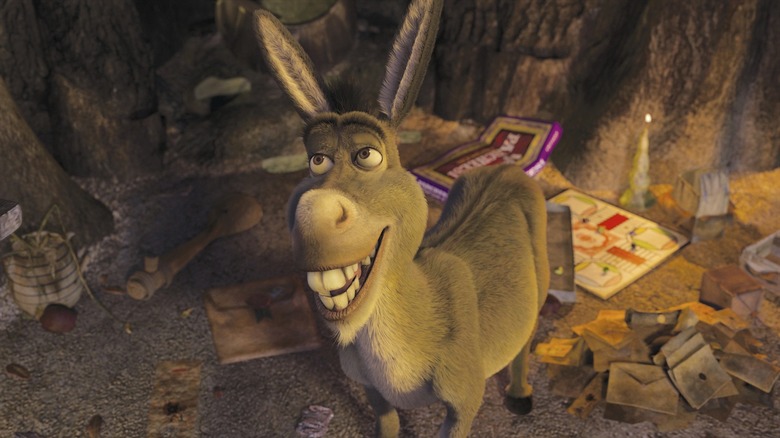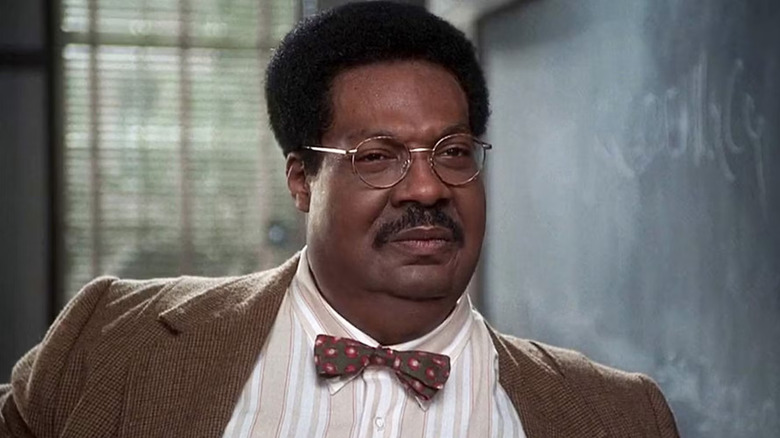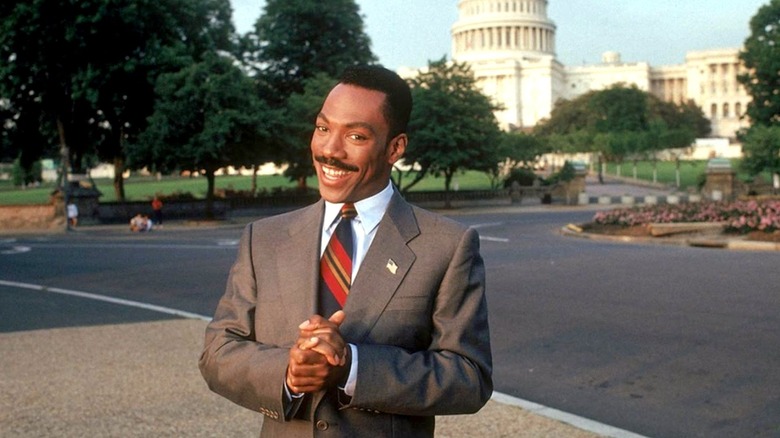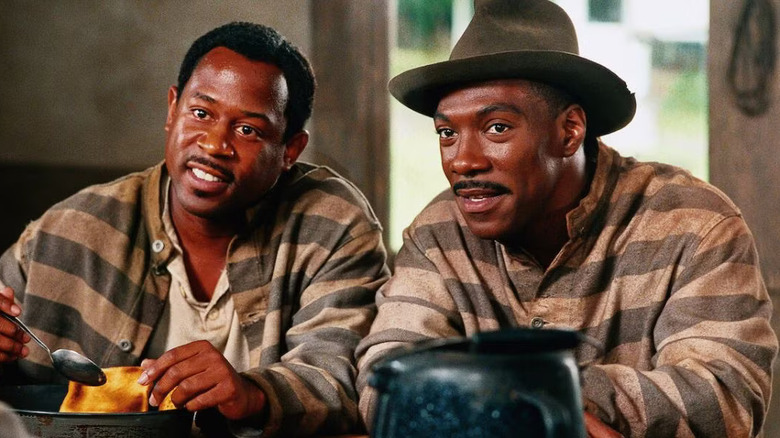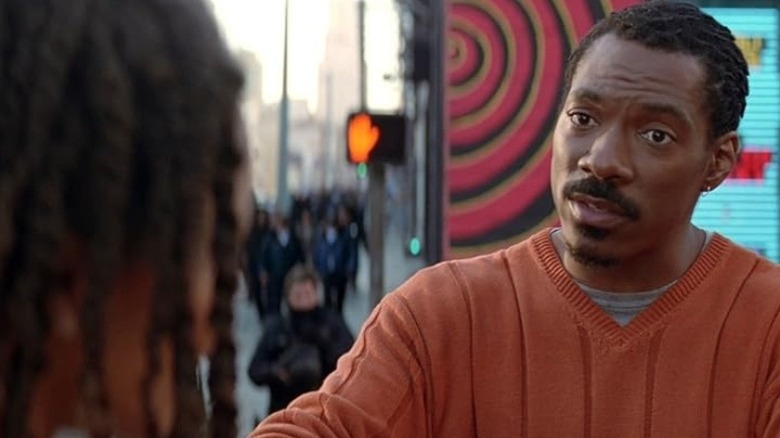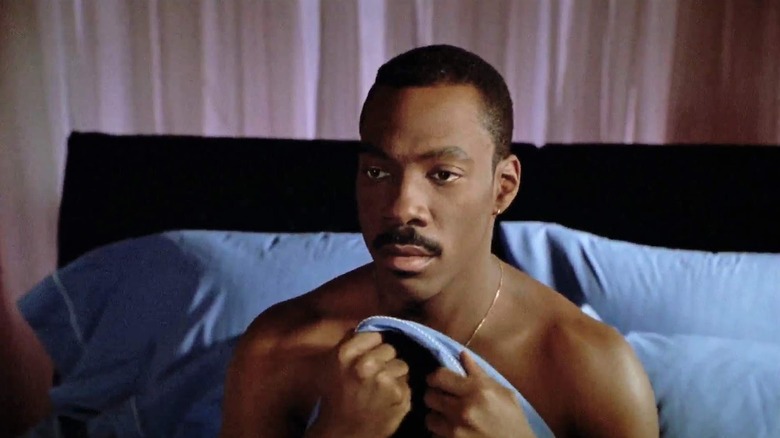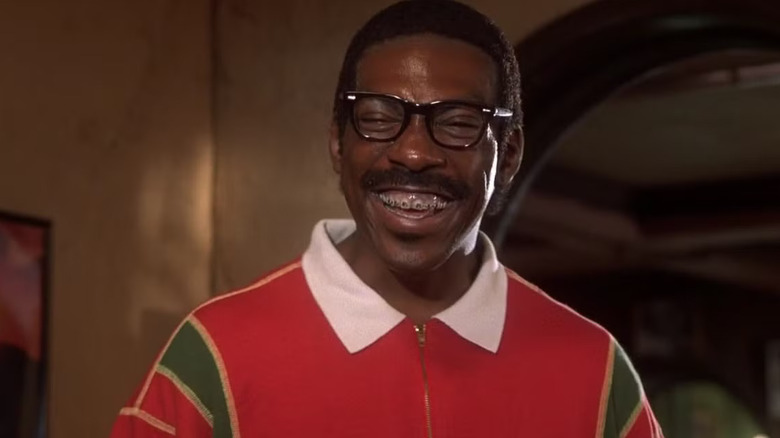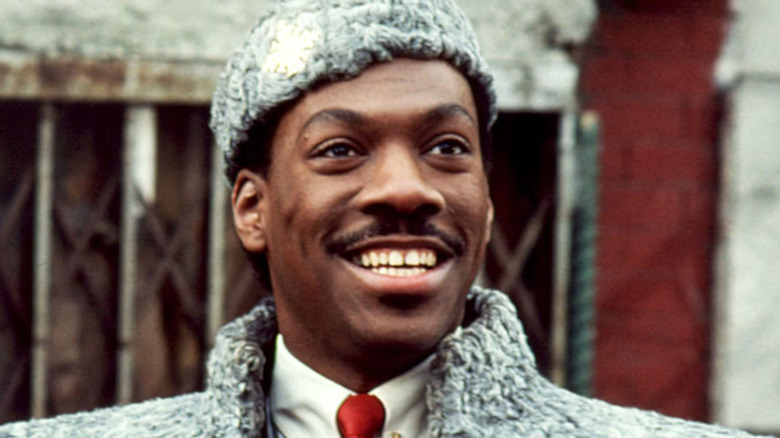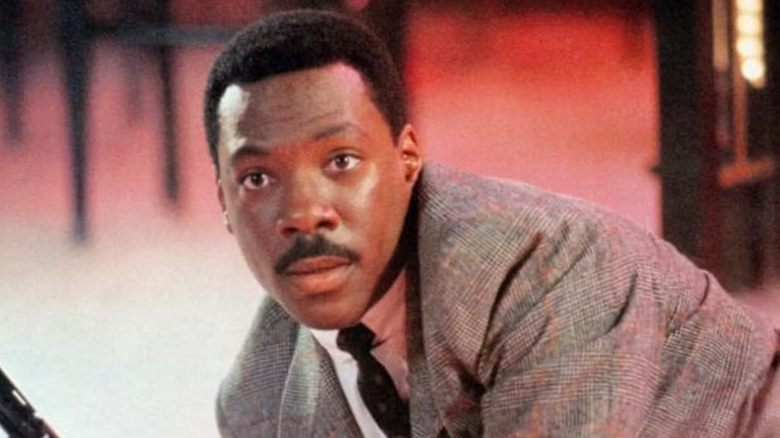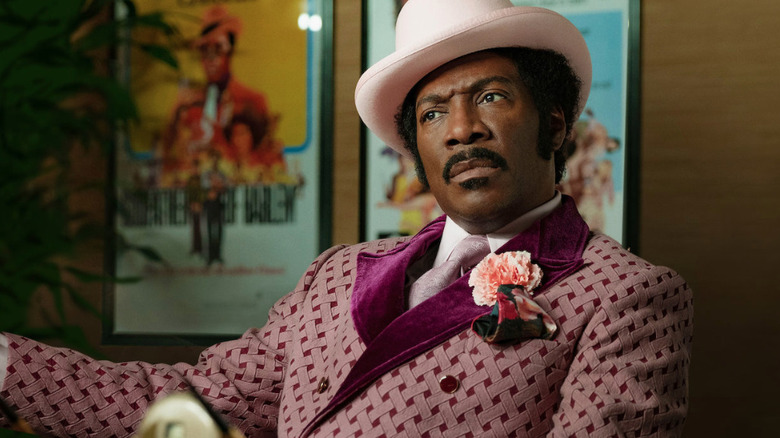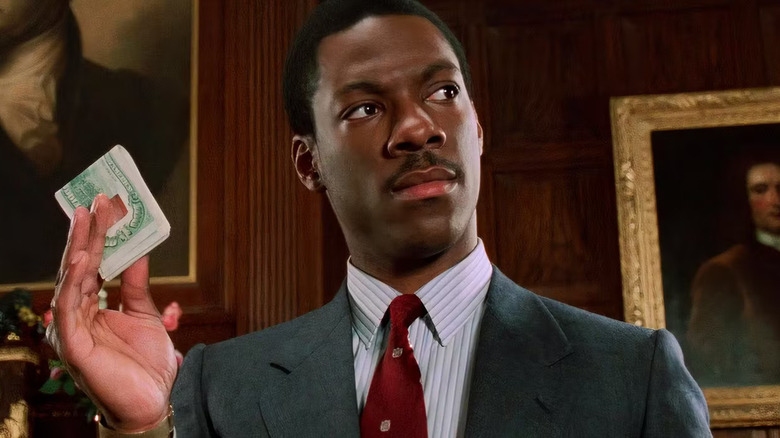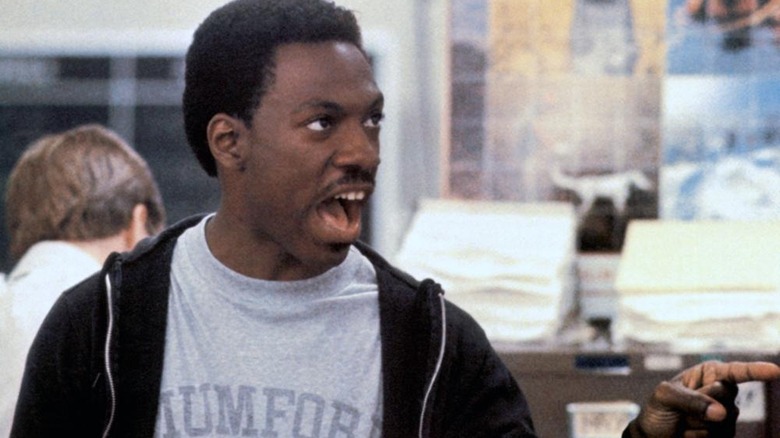The 15 Best Eddie Murphy Movies, Ranked
Eddie Murphy has made 42 feature films, not counting stand-up specials and documentary appearances. And while he's dabbled in dramas like many other comedians have, he remains best known for making people laugh. It's understandable, as he got his start on "Saturday Night Live" in 1980 before breaking out on the big screen with some of the decade's most memorable comedies. He went on to tweak his appeal and found even greater success with family comedies that still sit among his highest-grossing films (although he does regret turning down a movie in the 1980s that combined live-action with animation).
Of course, Murphy's also seen some down years as several of his movies failed to find receptive audiences or critical acclaim, resulting in some notably rough Rotten Tomatoes streaks. Films like "The Adventures of Pluto Nash," "Holy Man," and "Meet Dave" probably have their defenders, but don't go expecting to find them in the list below. We're here to celebrate his best films with a ranking you're most assuredly going to agree with — probably — so keep reading for our look at Eddie Murphy's 15 best movies.
15. Vampire in Brooklyn
Det. Veder (Angela Bassett) is struggling to crack a strange homicide case, so she's not upset when a new man enters her life to occupy her free time. Unfortunately for her, that new man is actually a vampire named Maximillian (Eddie Murphy), and he just may have something to do with the killings.
"Vampire in Brooklyn" was Murphy's only real horror outing — sorry, "The Haunted Mansion" stans — and while it leans into its romantic comedy vibes, the darker elements still land. That's probably to do more with director Wes Craven than anything/anyone else, but even as he finds solid beats there, he fumbles some elsewhere. It's a tonal issue that the film can't square. Still, Murphy is having fun cosplaying, the New York City setting and sets look cool, and Bassett gives a better performance than the film asks of her. On that last point, it's worth pointing out that the movie landed a similar spot on our ranking of Bassett's best films.
14. Harlem Nights
Sugar Ray (Richard Pryor) runs a gambling den in early 20th-century Harlem, and it's a living challenged daily by gangsters and crooked cops alike. He and his business partner, Quick (Eddie Murphy), differ on how to handle the conflicts, and it's not long before it all comes to a head.
Murphy's sole directorial effort was also his first real stab at more dramatic material, and while it was critically drubbed on release, there's more than enough to appreciate in "Harlem Nights." The script, also penned by Murphy, can't help but find some laughs when brought to life by its two leads, but it's plenty serious throughout as the pair deal with criminal pressures, racism, and personal conflict. It's an interesting enough experiment, even if its tonal imbalance makes it feel as if it doesn't quite know what it ultimately wants to be, and while Murphy and Pryor reportedly didn't quite get along during production, their onscreen chemistry remains suitably affecting.
13. Dreamgirls
Three women hoping to become popular soul singers find success after crossing into pop music, but that success comes at a cost. Ambition, talent, and love soon split the group apart.
Bill Condon's "Dreamgirls" is an adaptation of a 1980s stage musical and focuses mostly on two women in the group (played by Beyonce and Jennifer Hudson) and the producer (Jamie Foxx) who comes between them. Eddie Murphy plays a James Brown-like performer enduring his own ups and downs, and while it's a supporting role amid the ensemble, it's a memorable one thanks to his powerful performance. He gets to put his singing skills to good use — he's an accomplished singer with albums and soundtrack songs to his name — alongside his dramatic acting chops, and it resulted in an Academy Award nomination for Best Supporting Actor (and a spot on our list of the best movies based on Broadway musicals). He lost to Alan Arkin, but the nomination is enough to warrant the film's inclusion here.
12. Shrek 2
Falling in love was the easy part, but now the relationship between Shrek (Mike Myers) and Fiona (Cameron Diaz) is going to be truly tested as the newly married couple head off to meet her parents. Personalities clash, the Fairy Godmother seeks revenge, and the lovebirds realize too late the honeymoon is well and truly over.
Eddie Murphy is a supporting player in the "Shrek" films — numbering four in total as of this writing — but his Donkey is such an integral part of the core characters that the franchise had to make the list. Most would probably defer to the first film for the slot, but there's a case to be made that this first sequel is actually the superior movie (and a turning point in the history of animated films). All three main players kill it with their voice work, the writing is overflowing with funny gags and jokes that still work, and the level of talent spilling out of the side performers is equally hard to ignore with great turns by Antonio Banderas' Puss in Boots and Conrad Vernon's Gingerbread Man.
11. The Nutty Professor
Sherman Klump (Eddie Murphy) is a college professor weighing in at nearly 400 pounds, and he decides it's time to slim down after falling for a new teacher (Jada Pinkett Smith). Forget exercise or diet, though, as he's got a special formula that works ... with some peculiar side effects.
After donning practical makeup to play multiple characters in "Coming to America" and "Vampire in Brooklyn," Murphy ups his game on that front by playing seven different characters in "The Nutty Professor," a remake of a popular Jerry Lewis comedy from the 1960s that might be getting another remake. The makeup and fat suits won the film an Academy Award, and they hold up on rewatch, in part, because Murphy does a great job creating the distinct personas within each of the characters, including Klump, his family members, and Klump's obnoxious alter-ego, Buddy Love. The film itself finds laughs beyond mean-spirited weight jokes and instead embraces the personalities en route to the expected happy ending.
10. The Distinguished Gentleman
When a Florida congressman dies, a conman bearing a similar name (Eddie Murphy) runs for his seat, hoping to milk taxpayers of whatever he can get away with. His plans change, though, when he discovers the power he holds and the real needs of the people he represents.
"The Distinguished Gentleman" was easily Murphy's softest comedy since his forgotten pairing with Dudley Moore in 1984's "Best Defense," and the box office responded accordingly. Audiences just weren't interested in this side of the star — yet — but revisiting it in light of our real-world political landscape reveals it as both prescient and topical. It has some laughs, some heart, and a whole lot of truth about the corruption and red tape that keep even well-intentioned politicians from doing much good. It can't touch the likes of "Mr. Smith Goes to Washington" or "Dave," but fans of those films should give it a spin.
9. Life
Ray (Eddie Murphy) and Claude (Martin Lawrence) are strangers who become fast friends in 1930s Mississippi, but things take a turn after being framed for murder and sentenced to life imprisonment. Their friendship is tested over the decades that follow as escape attempts, tough circumstances, and loss follow them through the years.
"Life" confused a lot of people upon release as audiences struggled to decide whether it's a comedy or a drama. Surprise, it's both, with an arguable lean towards the latter as the film becomes something of a somber and sad look at two lives hampered by an unjust system. Murphy and Lawrence are both fantastic here, as are Rick Baker's practical makeup effects used to age them over the years, and both men end up tugging at heartstrings. It never screams its commentary on racial discrimination/inequality in the justice system, but it's there — and it hurts. But yes, it's also a comedy with some pretty big laughs!
8. Metro
A sadistic robber is captured by San Francisco's top hostage negotiator, Det. Roper (Eddie Murphy), and it creates a personal vendetta when the man escapes custody. Now, everyone Roper loves is caught in the crosshairs of a bad guy, and the cop isn't going to let him talk his way out of it.
A couple of Murphy's obvious stinkers are mentioned in the intro above, and some of you might have expected 1997's "Metro" to be among them. Well, you're not alone, as the general consensus on the film on release was pretty negative. Watch it now, though, and the film stands as a solid late 1990s action/comedy pitting an energetic Murphy against veteran villain Michael Wincott. The action beats deliver, including some terrific vehicular stunt action involving a trolley, and the film makes great use of the city's streets and sights. It's not as laugh-centric as "Beverly Hills Cop," but it shows once again that Murphy carries himself well on the action front.
7. Boomerang
Marcus (Eddie Murphy) is a ladies' man who's all about the numbers game, but he's floored when he finds a woman playing by the same rules. Even worse? He might just be falling in love with her.
Three years after his "Harlem Nights" fiasco delivered a gangster picture with a mostly Black cast, Murphy was back on top with a rare (for the time) romantic comedy focused almost exclusively on Black characters. "Boomerang" is a funny, sexy film — as evidenced by it landing a spot on our list of truly great movie kisses — that lets Murphy and friends earn laughs laced with wit and a little bit of naughtiness. Its morality lessons are standard fare for rom coms, but here they allow for not one, but two strong female lead characters played beautifully by Halle Berry and Robin Givens. Both women match Murphy laugh for laugh, beat for beat, with additional laughs coming from Martin Lawrence, David Alan Grier, John Witherspoon, and more.
6. Bowfinger
Bobby Bowfinger (Steve Martin) has one last shot to make it as a director in Hollywood, and he has the story, the crew, and the leading man to ensure it happens. If only someone had told the leading man (Murphy).
Frank Oz's "Bowfinger" belongs in that too-small subset of Hollywood films that look inward at Hollywood itself, typically with a biting and sharp eye. As is often the case with movies like "The Producers" and "The Player," there's a cynicism running throughout Oz's film regarding the eternal conflict between money and art. It's softer here, though, and big laughs couch a sincere appreciation for the art of filmmaking from both sides of the camera (something that can be found in many of these kinds of films). Murphy plays dual roles as twin brothers, one a famous actor and the other his shy, friendly doppelganger, and he does great work maintaining distinct personalities between them. Martin's script is incisive in its targets without ever forgetting that it's here for laughs, both smart and silly.
5. Coming to America
Akeem (Eddie Murphy) is a prince in his African homeland, but in Queens, New York, he's just another guy looking for love. He pretends to be a nobody in the hopes of finding a woman who loves him for him (and not his kingdom), but it's not going to be easy.
The streaming sequel from 2021 has already been forgotten, but 1988's "Coming to America" still stands tall as an acclaimed comedy blockbuster and Murphy's biggest live-action hit. It's an exaggerated fairy tale, of sorts, but the core themes about hard-working immigrants, Black generational wealth, and the misuse of hair products still land and give weight to the ridiculous laughs. The supporting cast is stacked, but this is also the first time Murphy would take on multiple roles using practical makeup effects — and the result is as hilarious today as it was nearly forty years ago. It wasn't as much fun to make, though, as Murphy's reunion with his "Trading Places" director led to friction, altercations, and some very harsh public words.
4. 48 Hrs.
Two hardened criminals are on the loose in San Francisco, and the city's grumpiest cop, Det. Jack Cates (Nick Nolte), is hot on their trail. He enlists the pair's former associate, Reggie Hammond (Eddie Murphy), to help bring them in, but that just might be more trouble than it's worth.
Murphy's first feature film was a big hit thanks as much to his comedic stylings as to Nolte's angrier performance, and both leads took full advantage of the film's R-rating with their banter. Director Walter Hill's "48 Hrs." is a movie with lots of bloody, thrilling action beats to offset the big laughs, and the result remains one of the great "mismatched buddy cop" films. It's a mean little movie, but it's also a fun one that made it immediately clear that Murphy was a talent to watch. The Safdie Brothers were briefly attached to a potential remake, but it feels wholly unnecessary, seeing as it basically kickstarted the buddy cop subgenre.
3. Dolemite Is My Name
Rudy Ray Moore believed in himself more than anyone before or since has ever believed in themselves. He sang, he did stand-up, and he created a character skilled in both martial arts and lovemaking, and then he made a movie that no one believed in — until it became a big hit.
Moore was a real talent, a man prone to poetry and foul banter in equal measure, and "Dolemite Is My Name" is as loving a tribute as any artist could hope for. Eddie Murphy plays Moore and captures both the man's eccentric personality and unrelenting charisma, and his journey from nothing to, well, everything, is told with a winning combination of sharp writing, genuine love for the man, and some spectacular laughs. It's ultimately an underdog story akin to something like Tim Burton's "Ed Wood" in its real appreciation for an artist who refuses to give up in the face of rejection. Murphy is joined by a fantastic supporting cast, including Da'Vine Joy Randolph, Craig Robinson, and Wesley Snipes (whose best films we also explored recently).
2. Trading Places
Two millionaire brothers make a small wager on the subject of nature versus nurture, and the pawns in their game are a snooty trust fund "kid" named Louis Winthorpe III (Dan Aykroyd) and a street-smart con artist named Billy Ray Valentine (Eddie Murphy). Louis' life is stripped away while Billy is given everything he could want, but when the pair discover the truth, they team up and get revenge.
"Trading Places" was a monster hit for Murphy, showcasing an easy chemistry with his fellow "Saturday Night Live" alum Aykroyd, as well as with Jamie Lee Curtis, who was hoping to shake off her "scream queen" label. (She succeeded by accepting it as part, but not all, of her screen persona.) It's all about the laughs, but the film threads them through with commentary on race and class in ways that feel more honest than preachy. The film is still very funny and remains highly quotable four decades later — even for those of us still confused about the ending and those damn orange juice futures.
1. Beverly Hills Cop
Axel Foley (Eddie Murphy) is a Detroit detective who's constantly skating on thin ice with his captain, but when a close friend is murdered, Foley pretends to take a vacation and instead heads to Los Angeles to track down the killers. Needless to say, his captain is not pleased.
Mention Murphy's name to most people over the age of 30, and the movie they're most likely to mention is Martin Brest's "Beverly Hills Cop." His earlier films saw him sharing the screen with co-leads, but this was his movie, beginning to end, and it made him a bona fide movie star. It remains his second-biggest live-action box-office hit as well, and while the three sequels are a mixed bag, the original's laughs, action, and energy remain undeniable. It also introduced some of us to the misguided idea of putting bananas in tailpipes, for better and (mostly) worse, but there are worse things a kid could learn from an R-rated movie.
